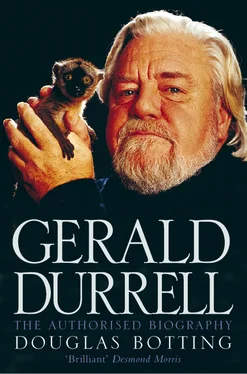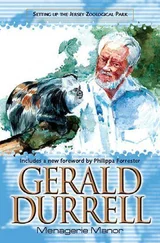The Water Shrew soon got tired of hanging by its tail, so turned and climbed up its own body and buried its teeth in Andrai’s thumb. He leapt about three feet in the air, and let out an ear-piercing scream of pain.
‘OW … OW … OW!’ he screeched. ‘Oh, Elias, Elias, get it off. OW … MY JESUSCRI … it done kill me … OW OW OW … Elias, quickly …’
Elias and I struggled with the animal, but I was laughing so much I was not much use. At last we got it off and pushed it wiggling and hissing into the bag. Andrai had to rest on the bank, moaning softy and tut-tutting over the mud on his pale mauve sarong. When he was quite sure he was not going to die we moved on, and further down the river we caught two crocs, so altogether it was a very good night.
There was no denying the courage, perseverance and expertise demonstrated by Gerald – and by his African companions, with whom he now began to relate more closely and sympathetically – in such difficult and challenging circumstances. It was as though he had been cut out for this unusual task from the cradle. His energy and enthusiasm were inexhaustible, his sense of humour rarely flagged, he delighted in the adventure and sheer unpredictability of it all, never knowing what the next hour would bring. Night after night and day after day he marched off into the forest, rarely emerging empty-handed. And as his collection of birds and animals grew, so did the workload of looking after them. He wrote to his mother:
The day goes something like this. Six o’clock, Pious appears in the tent, beaming, with tea. After three cups I feel I might live, so go down in my dressing gown to feed the birds and see what has escaped or died during the night. By the time I have done this my hot water is ready and I wash. After this I dash into my clothes and take the monkeys out of their sleeping boxes and tie them up to their poles. By this time my breakfast is ready: pawpaw, two eggs, toast, coffee. I have this and a fag and then start the real work of the day.
First, there are about four little boys with cages of birds to look at. I pick out the worthwhile ones to keep for John and pick out the ones that are almost dead to feed to the animals that eat meat. After this I repair to the Beef House, where Dan, my ten-year-old assistant, is awaiting orders. I clean out the birds, about ten cages, while he washes out the food and water dishes and refills them.
Then we start on the animals. The Mongoose has to be given a dead bird to chew so that I can get my hand inside to clean him out without getting bitten. Then the three cages of Brush-tailed Porcupine. Of these I have one full-grown pair which stink to high heaven, one full-grown female, and one tiny baby. The latter is very sweet and in the evening goes all skittish, leaping and gambolling like a rabbit. When he is frightened he stamps his feet and rattles his spines like knitting needles. Then it’s the turn of the Fruit Bats. Eating pawpaw and bananas all night their cage is always in the most frightful stinking mess. Then the monkeys have to be fed, and while this is going on you can’t hear yourself think.
Then come the reptiles. The chameleons have to be sprayed with water and given grasshoppers. The tortoises have to have fruit and greenstuff. And the crocs have to be washed (very difficult, this).
Then it’s lunch-time: soup, chicken with sweet potatoes and green pawpaw, fresh fruit, coffee, cigar. The hardship of collecting! After this, if I have been out all the previous night hunting, I sleep until tea-time; or I plunge into the forest with the hunters. After tea we start all over again: porcupine food, bat food, rat food, monkey milk, mongoose meat, water, etc. etc. I retire about seven, feeling shattered, to my bath, taken in the open before a group of fascinated villagers. Then dinner: duck or deer or porcupine meat, peas, potatoes, sweet, coffee, cigar. Three quick whiskeys, a short stroll round to see everything is alright, and so to bed.
There is so much to tell you about that I could sit down and write ten thousand words if I had time. How a crowd of tiny toddlers appears each day clutching tins, bottles and gourds full of grasshoppers. How a villager tried to strangle his wife down by the river and how the staff and I had to rush down, lay the man out and throw the mother-in-law into the river.
Gerald had now been in Eshobi for many weeks, and the animal collection had grown to such an extent that the Beef House was virtually full. Gerald had learnt the ways of the forest and its wild creatures – and of the Africans among whom he was living. His affection and respect for them – poor people, but brave, big-hearted, loyal and talented in many different ways – had grown, as had theirs for him. Though he was still the ‘Master’, he no longer felt as alien and insecure as he had when he first arrived, and he no longer insisted on the deference he had once thought befitted his status. Indeed, Sanders of the River was even showing signs of going native. ‘Sometimes in the evenings,’ he told Mother, ‘I would go and sit in the kitchen with the staff and discuss such thrilling topics as “Home Rule for the Cameroons” and “Did God Make the World in Seven Days?”’ His departure, when it came, was a matter of some emotion on both sides.
When we were ready to leave Eshobi the village threw a dance in my honour and I was escorted to the main square by the staff and all the village elders and enthroned in state in the front row. Everyone had on their best clothes, ranging from cheap print dresses to shorts made out of old flour bags. Elias, my hunter, was the M.C., clad in a green shirt and pinstripe trousers – God knows where he got them. He had an enormous watch-chain with a huge whistle on it, which he blew loudly to restore order. They do the most curious dances, which are a mixture of nearly every known dance, with the barn dance predominating. Elias, wagging his bottom in the centre, roared the instructions to the dancers: ‘ADvance!! … right turn … meet and waltz … let we set … all move … back we set again … ADvance … right turn … meet and waltz … conduct for yourself … etc. etc.’ When the dance was over the chief made a speech to me. It was really rather funny, because he stood in the centre of the square and so the poor boy who acted as interpreter had to keep running about twenty yards to tell me what he was saying and then run back to hear the next sentence. The speech went something like this:
‘People of Eshobi! You know why we are here tonight … to say goodbye to the Master who has been with us so long. Never in the whole history of Eshobi have we had such a Master … money has flowed as freely from him as water in the river-bed. Those who had the power went to bush and caught beef, for which they were paid handsomely. Those who were weak, the women and children, could obtain money and salt by bringing white ants and grasshoppers. We, the elders of the village, would like the Master to settle here. We would give him land and build him a fine house. We can only hope that he tells all the people in his country how we, the people of Eshobi, tried to help him, and to hope that on his next tour he will come back here and stay even longer.’
This was followed by loud and prolonged cheers, under cover of which the interpreter fainted into the arms of a friend. Then the band, consisting of three flutes and four drums and a triangle, struck up a red-hot version of ‘God Save the King’, and the party broke up.
So, very nearly, did Gerald himself. By now he was in a fairly exhausted condition. He had given his all in an unhealthy and enormously demanding environment. He had been bitten and stabbed by an extraordinary variety of fangs, spines, teeth, beaks, probosces, claws and jaws. He had had jiggers in his toes, ants in his pants, lice in his hair, bugs in his bed, and rats in his tent. He had reckoned on staying up all night packing, so as to be able to leave Eshobi before dawn and get to Mamfe around ten, before the sun got too hot for the animals. But after supper he began to feel very out of sorts, and by nine o’clock he was staggering about as though he was drunk. By ten he could barely walk, and had to be carried out to the latrine by Pious and George, the washboy. He collapsed on his bed, leaving it to the staff to pack up camp. Every five minutes Pious would creep in and peer down at him, making a solicitous ‘tch tch’ noise. Once George came in and tried to cheer him up, telling him that if he died they would never be able to find another Master like him.
Читать дальше










